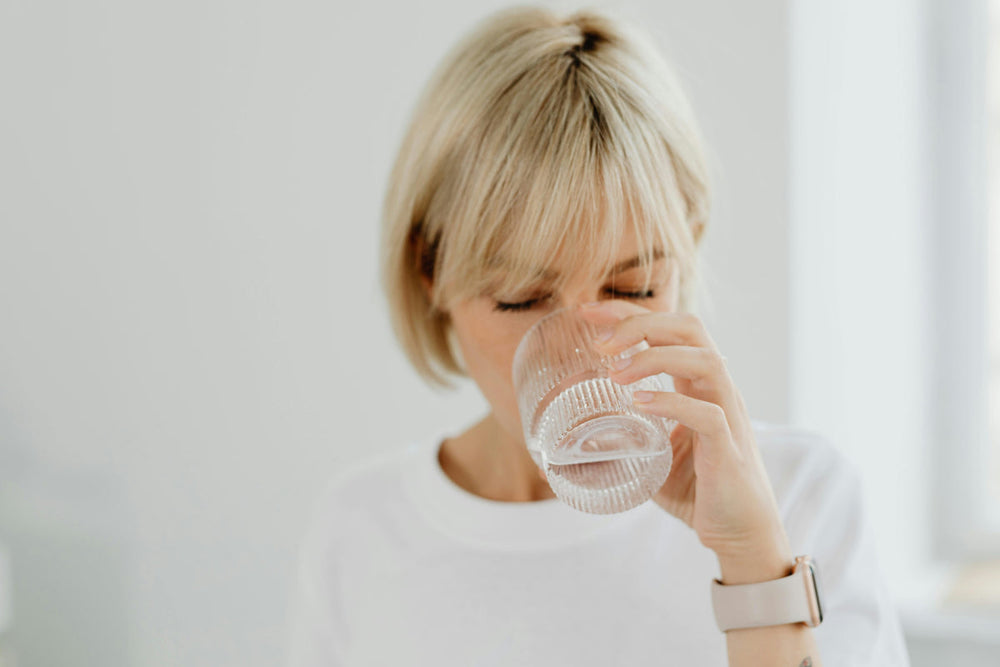When it comes to staying healthy and preventing urinary tract infections (UTIs), hydration is one of your best defenses. You’ve probably heard the classic advice—“Drink eight glasses of water a day!”—but does that work for everyone? The truth is, your body’s hydration needs are unique, and keeping your urinary system happy starts with understanding how much water your body actually needs.
Water makes up about 60% of your body, and staying properly hydrated can help flush out harmful bacteria, reducing your risk of UTIs. Not enough water - or dehydration - can also create a breeding ground for bacteria such as UTIs. So, how much water should you really be drinking to keep your bladder happy and healthy? Let’s dive in.
What is UTI And What Causes It?
A UTI occurs when bacteria, most commonly E. coli, enters your urinary system, causing infection in the urethra, bladder, or even the kidneys. Women are particularly prone to UTIs because of their anatomy—the urethra is shorter and closer to the anus, making it easier for bacteria to travel.
Certain factors can increase your risk of UTIs, including:
-
Sexual activity, which can transfer bacteria.
-
Using spermicides or spermicide-coated condoms.
-
Hormonal changes during pregnancy, which create an ideal environment for bacteria.
-
Chronic conditions like diabetes.
-
A history of UTIs, which makes recurrent infections more likely.
Pregnant women experience an increased risk, as hormonal changes can alter the composition of urine, making it a perfect breeding ground for bacteria. Further, when a baby is born bacteria can be transferred to the mom and increase the risk of UTIs. That’s why regular testing and prompt treatment are crucial during and after pregnancy.
How Do I Know If I Have a UTI?
Most women are familiar with the telltale signs of a UTI:
-
Painful or burning sensations when urinating.
-
A constant, urgent need to use the restroom i.e. urinary incontinence (check out our line of liners, pads, and briefs that keep you dry and comfortable).
-
Cloudy, foul-smelling urine.
-
Pelvic pain or discomfort.
Other symptoms might include blood in your urine, nausea, fever, or pain in your lower back or sides. These signs shouldn’t be ignored, as untreated UTIs can lead to more serious complications. However, if you get the proper treatment, UTIs can be cleared up within 3-5 days.
Does Dehydration Play a Role in UTIs?
While dehydration doesn’t directly cause UTIs, it can significantly increase your risk. Drinking less water means your bladder holds more concentrated urine for longer periods of time, creating the perfect environment for bacteria to grow.
Dehydration can also worsen bladder-related issues like urinary incontinence (UI). Drinking enough water may seem counterintuitive if you’re dealing with leaks, but staying hydrated actually helps keep your bladder functioning properly.
So, How Much Water Should I Be Drinking?
Your water needs depend on factors like age, activity level, and overall health. But, UTI patients are usually recommended to drink at least 6 to 8 cups of water every day, along with any necessary medication.
Can Drinking Water Flush Out a UTI?
Drinking plenty of water can help your body fight off mild UTIs by flushing out bacteria from your bladder. While water alone isn’t a substitute for antibiotics, increasing your hydration levels can make a big difference in symptom relief and recovery.
Here’s how hydration helps:
-
Frequent urination clears out bacteria before they have a chance to settle.
-
Proper hydration dilutes urine, reducing irritation in the bladder.
-
Drinking water keeps your urinary system healthy, making it harder for bacteria to thrive.
If your urine looks darker than usual, it’s a sign you need more fluids. Aim to drink water until your urine is pale yellow and clear.
Plus, drinking more water does other amazing things for your health:
-
Helps maintain an optimal body temperature
-
Properly lubricates your joints
-
Helps produce more sweat, further detoxifying your body
-
Works to prevent kidney stone formation
-
Can help with constipation
-
Maintains sodium levels in your body
-
Promotes skin health
Getting your daily water intake also doesn’t mean you just have to drink water. Snacking on water-rich foods like fruits and veggies add to your goal too! Watermelons and cucumbers, for example, are fantastic water-rich choices. You can even jazz up your regular water with some citrus. Just remember to steer clear of caffeinated drinks and soda, as they can cause dehydration.
What Are Other Ways to Prevent UTIs?
In addition to staying hydrated, there are simple steps you can take to prevent UTIs:
-
Practice good hygiene: Always wipe front to back and use gentle, chemical-free wipes like those from Attn: Grace to keep your intimate areas clean.
-
Choose the right products: Avoid scented or harsh feminine products that can disrupt your natural balance. Attn: Grace’s breathable, plant-based pads are a great option for keeping bacteria if you have bladder leaks or are menstruating.
-
Empty your bladder before and after sex: This helps flush out bacteria introduced during intercourse.
-
Take probiotics: Probiotics can help maintain a healthy balance of bacteria in your urinary system.
-
Limit irritants: Avoid sugary drinks, sodas, and caffeinated beverages, which can irritate the bladder.
The Bottom Line
Drinking enough water isn’t just good for preventing UTIs - it’s essential for your overall health. Staying hydrated keeps your urinary system functioning properly, flushes out toxins, and helps prevent bacteria from taking hold.
If you’re prone to UTIs, consider boosting your water intake to at least 2 liters a day and pairing it with healthy habits like proper hygiene and smart product choices. And if you’re ever in doubt or symptoms persist, don’t hesitate to consult your doctor.
Your bladder - and your body - will thank you for it.
